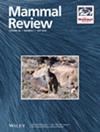Forest and Isolation Determine Bat Species Richness on Mediterranean Islands: Conservation Implications
Abstract
Background
The study of island species richness has gone far beyond traditional theories, as more and more studies attempt to include new predictor variables besides island area. Despite the rich bat diversity of Mediterranean islands, no studies have examined the factors influencing chiropteran species richness in such a geographic context.
Aims
We used Greek islands as a model to detect drivers of bat species richness based on a broad species occurrence dataset from islands of the Aegean and Ionian Seas, which was explored using 10 potential predictor variables.
Materials and Methods
Initially, we comprehensively evaluated all available data and sources for 53 Greek islands, deemed essential. This resulted in a reduced set of 28 islands. Predictors were grouped into three categories: island area, landscape diversity and island isolation. Generalised linear models were employed to identify the most significant factors explaining bat species richness in the 28 islands.
Results
Tree cover and the distance between the islands and their nearest coast (mainland or island) best performed to predict bat species richness on Greek islands.
Discussion
We show the important role of landscape composition and degree of isolation in influencing the distribution of bat species on islands.
Conclusion
We highlight the importance of forest habitats and the vital role of their management and protection, especially in the insular systems of the Mediterranean basin, where the risk of forest degradation or loss due to wildfires and land use change is especially high.


 求助内容:
求助内容: 应助结果提醒方式:
应助结果提醒方式:


